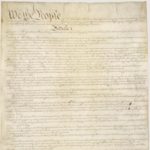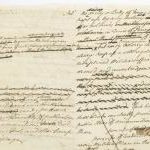In this lesson, students will read about a Kansas child involved in a famous United States Supreme Court case. They will think critically to form opinions about equality, segregation, and integration, and will distinguish between fact and opinion.
Who Elects Our Senators
United States senators have been elected directly by voters since 1913. Prior to that time, state legislatures chose the state’s senators. In the mid-1850s, however, the state legislature selection process began to fail due to political infighting and corruption. Often Senate seats were left vacant for long periods of time while state legislatures debated who to send to the Senate.
60-Second Civics Podcasts
60-Second Civics is a podcast that provides a quick and convenient way for listeners to learn about our nation’s government, the Constitution, and our history. The podcast explores themes related to civics and government, the constitutional issues behind the headlines, and the people and ideas that formed our nation’s history and government. The show’s content is primarily derived from the Center for Civic Education’s education for democracy curricula, including We the People: The Citizen and the Constitution, Foundations of Democracy, and Elements of Democracy. It’s easy to subscribe! Listen on iTunes or Stitcher or subscribe via RSS.
The Power of One Decision: Brown v. Board of Education

When minority students decided to take their challenge of the “separate but equal” doctrine to the Supreme Court, the 1954 decision handed down by the court in Brown v. Board of Education and enforced by the executive branch, changed their lives and America forever. In this lesson plan, based on the Annenberg Classroom video “A Conversation on the Constitution: Brown v. Board of Education,” students gain insight into decision-making at the Supreme Court, learn about the people behind the case, construct a persuasive argument, and evaluate the significance of Brown v. Board of Education.
The First Amendment: What’s Fair in a Free Country?

Young people have a profound sense of the importance of fairness. “It’s not fair” is often used as a one-size-fits-all argument when a child feels victimized. In situations where the child has an interest in protecting his or her actions, “It’s a free country!” is often the argument of choice. On the other hand, children are very sensitive about speech and policies they consider to have a negative effect on their well-being.
Balancing rights and responsibilities is difficult, even for the Supreme Court. This lesson demonstrates to students that doctrine of freedom of speech and its proper application is an ongoing process.
NewsFeed Defenders
NewsFeed Defenders is a challenging online game that engages players with the standards of journalism, showing you how to spot a variety of methods behind the viral deception we all face today. Join a fictional social media site focused on news and information, and meet the challenge to level up from guest user to site admin. This can only be achieved by spotting dubious posts that try to sneak in through hidden ads, viral deception, and false reporting. In addition to maintaining a high-quality site, you are charged with growing traffic while keeping the posts on topic.
Wisconsin v. Yoder (1972)
Under what conditions does the state’s interest in promoting compulsory education override parents’ First Amendment right to free exercise of religion? This resource is a case summary of Wisconsin v. Yoder, which tested the right of parents to withdraw their child from school for religious reasons.
Freedom of Speech: Finding the Limits
As part of the Bill of Rights, freedom of speech is guaranteed by the Constitution, but it is not defined by it. That task is left up to the people through a representative government that makes the laws and a judicial system that interprets and applies the laws to resolve disputes. In this lesson, based on the Annenberg Classroom video “A Conversation on the Constitution: Freedom of Speech,” students gain insight into the many challenges involved in defining and protecting free speech. They also learn about principles that come from Supreme Court decisions and case law that are applied to define the limits for us today.
Drafting the Nation

As the Framers drafted different versions of our founding documents, their ideas of what it meant to be a republic also changed. In this unit, four lessons based on the drafts of the Articles of Confederation, Declaration of Independence, and the Constitution, held at the collection at HSP, allow students to explore the language and ideas behind these pivotal documents
Elonis v. United States (2015)
Does a conviction of threatening another person under 18 USC §875(c) require proof of the defendant’s subjective intent to threaten? This case summary explores the meanings and standards of proof behind intentions.